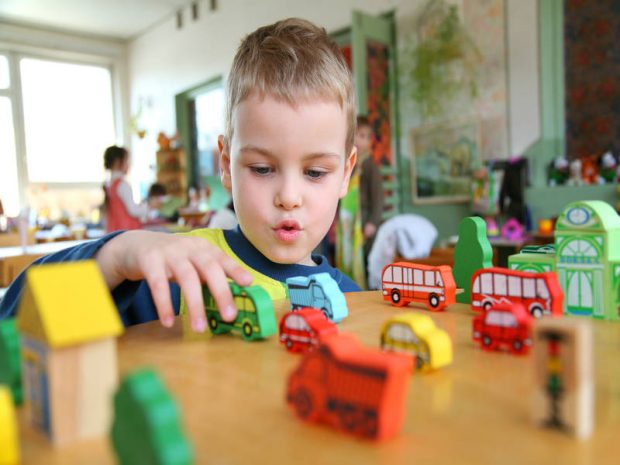Within a day care setting, children can learn social skills, participate in group activities, and often enjoy a head start on academics. At the same time, however, children in daycares may experience stresses and pressures that find expression through behavioral issues. To maximize the developmental benefits while minimizing many of the risks, then, at what age should parents consider placing their children in childcare?
While the question appears straightforward, the answer is not quite as simple. Some experts suggest placing a child in day care early on, while others recommend waiting until the child is closer to school age. Karen Miller, the author of Simple Steps: Developmental Activities for Infants, Toddlers, and Two-Year-Olds, suggest that the best time is right after a child turns one year old. “A child at this age is making leaps in her language, social, and motor skills. The constant flow of new people and stimulating activities in day care can fulfill a toddler’s need to learn and explore.”
At the other end of the spectrum, experts such as Dr. Laura Markham, author of Peaceful Parent, Happy Kids: How to Stop Yelling and Start Connecting, insist that day care – anything involving more than a few hours – should be reserved for those children about one year away from entering the school system. “The ideal age to start all-day care (meaning approximately 9am-3pm) is actually not until at least four, if not five, years old. That’s because toddlers and preschoolers who are in preschool all day have heightened levels of cortisol and other stress hormones by the afternoon.”
Which of these schools of thought is correct? When experts promote such conflicting conclusions, how can parents know which advice to follow? The reality is that each child and every situation is unique. To help you answer the question for your child, consider the following four factors:
The stability of the home. Children who have confidence in the love, support, and presence of at least one parent at home are much better equipped to handle periods of separation throughout the day. A study by the U.S. National Institute of Child Health and Human Development on the impact of day care enrollment concluded that “parent and family characteristics were more strongly linked to child development than were child care features.
The presence of siblings. Children with younger brothers or sisters at home typically find themselves vying for attention; placing a child in day care can circumvent this competition. Particularly in a home with a baby on the way, an older sibling can benefit from a child care settings where he or she is not competing for the attention of parents.
The personality of the child. Can he or she make new friends? Does your son or daughter adjust quickly to new environments, or do such settings result in excessive levels of stress? How does your child respond to noisy environments with a lot of activity? If such transitions are difficult, waiting until later to place a child into day care would be preferable.
The attention received at home. Playing, laughing, and even roughhousing with your child can help your child cope with stress and enable him or her to better adapt to enrollment in day care.
The stability of the care arrangement. If your child will be regularly moved from one day care to another – or if the selected day care experiences a high rate of turnover – then your child will spend more time making new friends than developing lasting relationships.
Family and work realities often dictate decisions regarding child care, but the best interests of the child should always be paramount. The ideal age for entering day care varies from child to child, but the home — whether or not a child receives loving, attentive, and responsive care at home — remains the primary influence in a child’s life.











No Comments